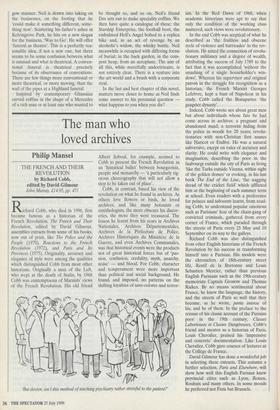The man who loved archives
Philip Manse!
THE FRENCH AND THEIR REVOLUTION by Richard Cobb, edited by David Gilmour John Murray, £14.95, pp. 471 Richard Cobb, who died in 1996, first became famous as a historian of the French Revolution. The French and Their Revolution, edited by David Gilmour, assembles extracts from some of his books, now out of print, like The Police and the People (1970), Reactions to the French Revolution (1972), and Paris and Its Provinces (1975). Originality, accuracy and elegance of style were among the qualities which distinguished Cobb from most other historians. Originally a man of the Left, who wept at the death of Stalin, by 1968 Cobb was contemptuous of Marxists' views of the French Revolution. His old friend Albert Soboul, for example, seemed to Cobb to present the French Revolution as an 'historical ballet' between bourgeoisie, people and monarchy — 'a particularly rig- orous choreography that will not allow a step to be taken out of place'.
Cobb, in contrast, based his view of the revolution on what he found in archives. As others love flowers or birds, he loved archives; and like many botanists or ornithologists, the more obscure his discov- eries, the more they were treasured. The lesson he learnt from his years in Archives Nationales, Archives Departementales, Archives de la Prefecture de Police, Archives Historiques du Ministere de la Guerre, and even Archives Communales, was that historical events were the products not of great historical forces but of 'pas- sion, confusion, credulity, myth, anarchy, noise' — and blood. For Cobb, character and temperament were more important than political and social background. He found, and imposed, no patterns on the shifting loyalties of sans-culottes and terror- ists. In the Red Dawn of 1968, when academic historians were apt to say that only the condition of the working class mattered, such views were revolutionary.
In the end Cobb was sceptical of what he described as 'the fruitless and obscene cycle of violence and barricades' in the rev- olution. He noted the connection of revolu- tionary militancy and a degree of wealth, attributing the success of July 1789 to the fact that it was accomplished 'without the smashing of a single householder's win- dows'. Whereas his supervisor and original patron in the struggle for recognition as a historian, the French Marxist Georges Lefebvre, kept a bust of Napoleon in his study, Cobb called the Bonapartes 'the gangster dynasty'.
Indeed, Cobb wrote not about great men but about individuals whose fate he had come across in archives: a pregnant and abandoned maid; a terrorist hiding from the police in woods for 20 years; revolu- tionaries with non-Christian first names like Haricot or Endive. He was a natural subversive, except on rules of accuracy and clarity. He could write with elegance and imagination, describing the poor in the faubourgs outside the city of Paris as living 'like the Turks outside Vienna, within sight of the golden domes' or evoking, in his last book The End of the Line, 'the nagging dread of the cricket field' which afflicted him at the beginning of each summer term at school. Even readers with a preference for princes and tabourets learnt, from read- ing Cobb, to understand popular emotions such as Parisians' fear of the chain-gang of convicted criminals, gathered from every corner of France, which paraded through the streets of Paris every 25 May and 10 September on its way to the galleys.
Richard Cobb was also distinguished from other English historians of the French Revolution by his success in transforming himself into a Parisian. His models were the chroniclers of 18th-century street life, Restif de la Bretonne and Louis Sebastien Mercier, rather than previous English Parisians such as the 19th-century memoirists Captain Gronow and Thomas Raikes. By no means sentimental about France, he knew the language, the history, and the streets of Paris so well that they become, as he wrote, partie intense of his, and he of them. In the preface to the reissue of his classic account of the Parisian poor in the 19th century, Classes Laborieuses et Classes Dangereuses, Cobb's friend and mentor as a historian of Paris, Louis Chevalier, praised his 'impressive and concrete' documentation. Like Louis Chevalier, Cobb gave courses of lectures at the College de France.
David Gilmour has done a wonderful job in selecting these extracts. This autumn a further selection, Paris and Elsewhere, will show how well this English Parisian knew provincial cities such as Lyon, Rouen, Roubaix and many others. In some moods he preferred not Paris but Brussels.


























































 Previous page
Previous page